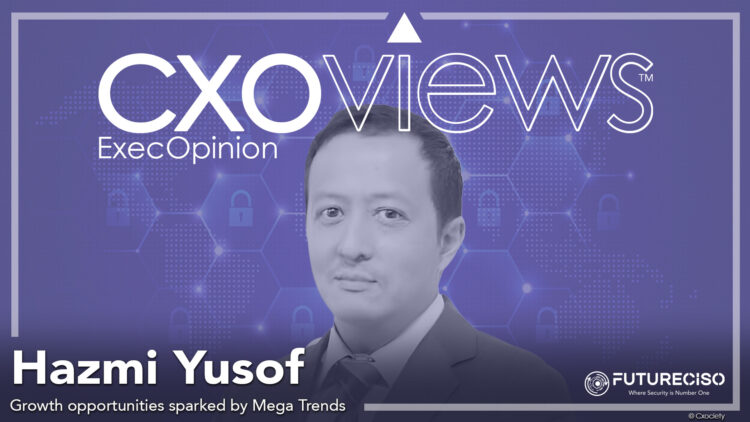In his closing keynote during the FutureCIO Conference in Malaysia, Hazmi Yusof, country head of Malaysia at Frost & Sullivan, said two questions keep CEOs awake at night: "How do I grow my business?" and "How do I grow my business consistently and sustainably?"
Yusof underscored that understanding global Mega Trends is the key to addressing these two pivotal questions. Mega Trends, he explained, are not just macroeconomic forces, but potential catalysts for development that will significantly impact businesses, people, government, and society.

Curating the future
Frost & Sullivan considers Mega Trends to provide clarity on how to approach insight-based perspectives effectively and provide a game plan for action. It illustrates core trends that will drive opportunities over the coming years, characterises mechanisms that translate trends into optimal growth potential, and shows how to embrace trends as a means for innovation, generate new ideas, and support existing initiatives.
Yusof encouraged companies to align their growth strategy to leverage transformative Mega Trends in 2040 that are set to redefine business and economies. Frost & Sullivan's
Mega Trend Universe consists of five main Mega Trends driving businesses: Social Evolution, Technology Advancements, Environmental Priorities, Economic and Political Shifts, and Business Model Transformations.
Social evolution
As of 2023, data from Frost & Sullivan shows that 4.9 billion people use social media globally, giving rise to virtual communities consisting of individuals who prioritise virtual over physical engagement. According to Yusof, this "virtual society" creates "virtual tribes" that highlight customers' interests, preferences, and lifestyles instead of categorising them through general demographic information such as age or location, pushing companies to shift from demographic information to customer intimacy.
This social evolution entails organisations redefining their views of market engagement, human capital talent management, and connection. Frost & Sullivan also encourages companies to "create brand communities and align with the values of virtual tribes, leading to fragmentation in the B2C environment."
Yusof stressed the importance of understanding the social dynamics of different generations in today's workforce. "To attract and retain talent," he said, "we must understand generational differences and adapt to their needs and expectations."
With social media usage rising globally, the social economy revolution will be unprecedented. Data analytics and AI will take center stage in providing customised consumer recommendations, especially since virtual societies prioritise personalisation. Businesses will need to transform their strategies to reach virtual communities by leveraging new technologies, social commerce, and income-generating opportunities.
Technology advancements
Regarding artificial intelligence (AI), Yusof said national language processing (NLP) will emerge as the core AI technology for human-to-machine interactions and pave the way for text-to-text, text-to-image, and text-to-image technologies. Companies will maximise their ability to understand, interpret, comprehend, and generate responses in natural language.
"The machine will learn in a deeper, more connected way the nuances or the layers of information so the approach will not be black or white," he said.
He added that the development would allow better customisation and personalisation based on customers' needs and preferences.
Environmental priorities
Frost & Sullivan projects that by 2024, companies will focus on carbon neutrality and negativity or achieve pre-global industrialization carbon levels by removing carbon from the atmosphere. Yusof said the global shift towards sustainability and achieving net-zero carbon emissions is "something that only technology can make happen."
He said that the next decade would see carbon capture, utilisation, and storage, especially in the industrial sector.
"We will not be economically resilient if we are not on the board with our environment and sustainability," Yusof said.
We will not be economically resilient if we are not on the board with our environment and sustainability.
Hazmi Yusof
He projects government intervention through regulations and taxes to further push sustainability objectives.
Economic and political shifts
"If we plan for our addressable market, it's going to be in Asia, [where] excitement will happen," Yusof said.
Frost and Sullivan reports the long-term growth potential market in APAC and projects accelerated growth in India and China due to increasing commercial projects. Yusof said that with Asia's diverse stages of development, it is an ideal place for organisations to achieve market presence and expansion. Aside from that, Asia's large population, growing consumer classes, and increasing military might drive the so-called "Asian Tilt," or the shift in global and economic power toward Asia.
Business model transformation
Yusof said that digital transformation drives one of the biggest Mega Trends that has disrupted companies globally—model transformation. He considers the shift quite daunting if organisations fail to prepare for it. Part of the business model transformation is the value chain compression, or the "evolution of current product-centric value chains towards consumer-centric data, systems, and services", and strategic redundancy, or "risk-proofing businesses by cutting down on the over-dependence or weak links in the global supply chain continuum," according to Frost & Sullivan.
"Many retailers, distributors, and middlemen have been edged out," Yusof said, mentioning that the value chain could become even shorter in the next ten years. He underscored the importance of market intimacy and selling a product directly to the customers by understanding their preferences and needs.
Curating the future
Yusof invites organisations to consider the identified Mega Trends, understand the sub-trends, and align them within the context of their industries, as this can bring significant benefits and potential advantages.
Frost and Sullivan recommend organisations to advance digital integration, practice sustainability, demographic and consumption adaptation, cybersecurity and digital governance, and economic and political orientation.
Businesses can benefit from forward-thinking insights and the motivation of action-based awareness of Mega Trends to help them better prepare for the challenges and opportunities ahead.




